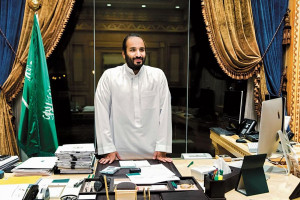
Never since the death of King Abdullah in 2015 has the kingdom faced such political fluidity. By that I mean that Saudi Arabia went from playing second, third, and fourth fiddle to world powers, to politically, and economically imprinting onto others. Following decades of what I would describe as political submission, Riyadh suddenly reinvented itself a wannabe superpower – its ambition set alight by al-Saud new royal generation.
It is likely King Abdullah’s reign will be remembered for the calm it guaranteed, while King Salman’s spell on the throne will rhyme with violence, bloodshed and a shuffling of the kingdom’s once deep state. But is King Salman actually sitting on that throne?
If sources close to Riyadh palaces are to be trusted King Salman, one of al-Saud’s last princes of old, suffers from dementia, or Alzheimer – both degenerative mental diseases. And while the court so far at least, has been able to keep a lid on such development – mental lapses do not exactly scream political stability, or confidence, al-Saud Royals could be running out of road to walk on …
Actually, it is rather Prince Mohammad bin Salman, whose window of royal opportunity could be closing.
Allow me to explain – While Mohammed bin Salman remains still the kingdom’s crown prince, and designated heir to the throne should his father pass away, he is not exactly a favourite among the old al-Saud guard – not when his rise to power has meant that several of his powerful uncles and cousins were side-lined. Many in Riyadh have actually argued that while Prince bin Salman managed to fast-track himself to power on both his father’s mental weakness and affection, many still see his arrival to the height of power as an inherent threat to the kingdom.
Needless to say that Yemen’s war of attrition comforted Prince bin Salman’s opponents into believing that he is much too rash, and brash to make a suitable king.
Those inner tensions which poisoned Saudi Arabia in early 2015, on the wake of King Abdullah’s death are still very much alive – only now they have taken on new shapes, and could prelude to a different type of conflict.
A report published by Press TV this June 1st, read: “Saudi Defense Minister and Deputy Crown Prince Mohammed bin Salman has issued orders to the Saudi court banning any manner of meeting with the king due to his “brain damage”, said the report published by the Palestinian Manar online newspaper on Wednesday, citing an informed source. The denial of visiting rights encompasses all members of the royal family and foreign dignitaries.”
Just in case you were still wondering who is de facto ruling over the kingdom, Prince bin Salman quite loudly staked his claim on the throne – sending all others packing. The order it needs to be said applies to all officials: whether at home or abroad.
As of June King Salman was made to completely step out the limelight, while his son would work to assert his hold onto the monarchy.
Soft coup d’etat anyone?
I realise that Prince bin Salman still stands the designated heir to al-Saud dynasty, but his desire to eclipse all competition – which desire was sparked long before his father rose to power, screams political opportunism and manipulation.
A young, inexperienced, and belligerent prince, Mohammed bin Salman is not everyone’s choice – not in the kingdom, not across the region, and not throughout the international community.
Why not you say? Simply because this prince does not take his cue from Western capitals, and because this prince has a propensity to threaten, blackmail, and bully his foreign “partners” into submission.
You will recall with which insistence Riyadh leaned on Washington so that its 9/11 law would remain buried somewhere on the desk of US President Barack Obama …
So much so in fact that Riyadh openly threatened Washington with financial retributions should it defy its royal will. In April, the New York Times reported that Saudi officials they would sell $750 billion of Treasuries and other assets in the US if Congress passed the bill.
If the kingdom and the US project still an air of friendship, such bravado on the part of Prince bin Salman – fool yourself not, the threat came from his royal highness, does not make for lasting partnerships.
Let’s just say that Saudi Arabia’s recent desire to step out of the shadows, and stretch its political muscles has annoyed more than one world capitals. Added to that the fact that the kingdom stands still without any real military power – safe of course from its ability to buy mercenaries, and you may find that the House of Saud sits on dangerously thin quicksand.
If Prince bin Salman succeeded so far in imprinting his political brand onto the kingdom, that it is not to say that his father’s deteriorating health will play in his favour.
The crown prince faces tensions at home as well. Prince bin Salman is not a big fan of his ancestors’ reliance on Wahhabis clerics as a source of “religious” legitimacy. In fact, and this maybe the prince’s only redeeming quality, he would much prefer to do away (politically speaking) with the Sheikh family – the descendants of Mohammed bin Abdel-Wahhab, the man who rose Wahhabism as the kingdom’s state religion – or dogma depending on where you stand.
At this particular juncture in its his history Saudi Arabia has been stripped of the very legitimacy which made it whole. For the first time in its history the kingdom is also set to depart from its rule on succession: brother to brother.
Soft coup d’etat or not, Mohammed bin Salman might not have the last laugh yet.
Catherine Shakdam is the Associate Director of the Beirut Center for Middle Eastern Studies and a political analyst specializing in radical movements, exclusively for the online magazine “New Eastern Outlook”.
